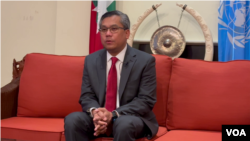Ambassador Kyaw Moe Tun is the permanent representative of Myanmar to the United Nations; however, the diplomat does not represent the country's ruling military junta.
Kyaw Moe Tun was appointed to his position in 2020, months before the military overthrew the elected civilian government in February 2021. The military junta tried to fire him from his post, but he refused to leave, and so far, the United Nations General Assembly Credentials Committee has refused to recognize the military's appointee. He is also backed by Myanmar's National Unity Government (NUG), established by the country's elected and now-removed legislators.
On Monday, a U.N. diplomat told VOA that the U.N. credentials committee had agreed to uphold his status as Myanmar's ambassador. The diplomat declined to speak on the record before the committee formally announces its decision.
Last week, VOA's Ingyin Naing interviewed Kyaw Moe Tun at his office in New York to discuss what it is like representing a government that rejects him and how he sees his role as diplomat.
This interview has been edited for brevity and clarity.
VOA: What do you think about the upcoming decision on Myanmar U.N. representations this year?
Ambassador Kyaw Moe Tun: Since last year, two countries, namely Afghanistan and Myanmar, had competing credentials with regard to the respective delegations. So, last year, the credentials committee decided to defer the decisions on the credentials of Afghanistan and Myanmar.
How they will decide depends, of course, on the members of the Credentials Committee. Russia, China and the United States are the three members who are elected every year. [[This year the credentials committee members also include Angola, Austria, Guyana, Maldives, Uruguay and Zambia.]]
VOA: You also voted this year to condemn Russia's invasion of Ukraine and to suspend Russia's membership at the U.N. Human Rights Council. Do you think that your stance on those issues affects Russia's decision on the matter of who should represent Myanmar and that they might prefer the Myanmar junta's representative?
Ambassador Kyaw Moe Tun: We not only voted yes but also co-sponsored the resolutions because the reason is very simple and very clear: We the people of Myanmar need to stand firm with the people of Ukraine, who are suffering like the people of Myanmar. By co-sponsoring the resolution, by voting yes on the resolution, we stand firm with the people of Ukraine. Russia will not be happy with that. So, whatever they decided regarding the representation of Myanmar here in the U.N., they will not be in favor of the permanent representative, who is appointed by the elected civilian government, who is speaking for the people of Myanmar.
VOA: What do you think about China also publicly backing the Myanmar junta?
Ambassador Kyaw Moe Tun: You can compare China and Russia. But what I know is that the high-level visit from China is what we don't see during this time. But of course, the last time Chinese Foreign Minister Wang Yi visited Myanmar [in July], that was only for the subregional meeting, not for the bilateral meeting.
China was making it clear that the visit was not for a bilateral visit and was for the subregional group meetings, the Lancang-Mekong meetings. So, it is clear the position of China is different from the position of Russia because Russia's foreign minister visited Myanmar on bilateral bases.
China is also our neighboring country and a permanent member of the Security Council. That is why we always value the role of China. Of course, there are other neighboring countries whose roles we value — not only China but also India, Bangladesh, Laos and Thailand.
The role of the neighboring countries is very important. The neighboring countries of Ukraine open their borders, open their arms and extend warm hospitality to the Ukrainians, who escaped from the aggression and who take refuge in the neighboring countries. We wish our neighboring countries would be like those of Ukraine.
Back to the question about the position of China, of course, it is different from the position of Russia. That is my personal point of view.
VOA: According to some news agencies, Ukraine sold weapons to the Myanmar military. Did you ask Ukraine's diplomats about selling weapons to the Myanmar military when you met them?
Ambassador Kyaw Moe Tun: To be very frank, I haven't brought this issue to the Ukrainian ambassador here. But I do understand that the selling of weapons was before the military coup. I do understand that after the military coup, the government of Ukraine was not selling any kind of weapons to the military, who use these weapons to kill innocent civilians. So according to my knowledge, Ukraine as a government is not selling any kind of weapons to the Myanmar military.
VOA: You have spoken frequently in your speeches at the U.N. committee meetings about the U.N.'s failure to protect the Myanmar people who are being oppressed by the military junta. Do you have any hope for concrete action from the U.N.?
Ambassador Kyaw Moe Tun: Our people are really helpless, and even they were holding the placards carrying the R2P — "responsibility to protect." Since then, in my statements at the U.N., I tried to convey the people's voices — like asking the U.N. to apply the principles of R2P to save the lives of the people of Myanmar. Even though, of course, it is very frustrating because no one ever will make the statement whenever we made the appeal. Whenever we meet, that demand does not really come out in practical terms. But on the other hand, sometimes in multilateralism, the result takes time.
As a diplomat sitting here in New York, even though I have that frustration, at the same time, I understand the situation on the ground here: The U.N. is composed of 193 member states.
VOA’s U.N. correspondent Margaret Besheer contributed to this report.




